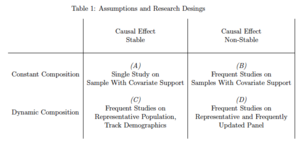
Abstract
The "credibility revolution" has forced social scientists to confront the limits of our methods for creating general knowledge. The current approach aims to aggregate valid but local knowledge. At the same time, the increasing centrality of the internet to political and social processes has rendered untenable the implicit ceteris paribus assumptions necessary for aggregating knowledge produced at dierent times. The interaction of these two trends is not yet well understood. I argue that a high rate of change of the objects of our study makes "knowledge decay" a potentially large source of error. "Temporal validity" is a form of external validity in which the target setting is in the future|which, of course, is always the case. A crucial distinction between cross-sectional external validity and temporal validity is that the latter implies a fundamental incompleteness of social science that renders the project of non-parametric knowledge aggregation impossible. I discuss the limitations of extant strategies for knowledge aggregation through the lens of temporal validity, and propose strategies for improving practice.
